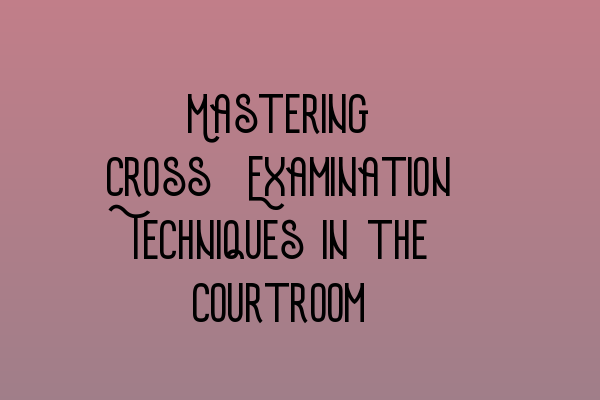Mastering Cross-Examination Techniques in the Courtroom
As a criminal law practitioner, one of the most essential skills you need to master is the art of cross-examination in the courtroom. Cross-examination is a crucial tool that allows you to challenge the credibility and reliability of witnesses, test their evidence, and ultimately sway the jury or judge in your client’s favor. In this blog post, we will explore some key cross-examination techniques that will help you become a master of the courtroom.
Preparation is Key
Before diving into the techniques, it’s important to stress the significance of preparing for cross-examination. Thoroughly review all the evidence, witness statements, and other relevant materials. Identify the strengths and weaknesses of your case and the opposing party’s case. Plan your questions strategically to expose inconsistencies or flaws in the witness’s testimony.
Additionally, it’s crucial to be familiar with the SQE 1 Practice Exam Questions and SQE 1 Practice Mocks FLK1 FLK2 to test your legal knowledge and boost your confidence.
The Basics of Cross-Examination
Begin your cross-examination with open-ended questions to establish a rapport with the witness. This will help put them at ease and may encourage them to reveal more information than they had intended. Listen carefully to the witness’s answers and use their responses to craft follow-up questions that challenge their credibility or unearth inconsistencies.
Remember to maintain control during cross-examination. Ask leading questions that allow for a simple “yes” or “no” answer, preventing the witness from giving lengthy explanations that could strengthen their case. Use the witness’s own words against them, reminding them of previous statements or contradictions to create doubt in their testimony.
Your goal during cross-examination should be to establish that the witness may be mistaken, biased, or lacking in credibility. Use effective body language and tone of voice to convey confidence and control. The jury or judge will be watching your interactions closely, and a composed and focused approach can enhance your credibility as an advocate.
Advanced Techniques
Once you have a solid foundation in the basics of cross-examination, you can delve into more advanced techniques to further sharpen your skills. Consider implementing the following strategies:
- Impeachment: If a witness has given previous inconsistent statements, use those statements to challenge their credibility and point out the inconsistencies in their testimony.
- Contradiction: Carefully analyze the witness’s testimony and evidence to identify any contradictions or inconsistencies. Highlighting these discrepancies can significantly weaken their case.
- Limiting Concessions: Get the witness to agree only on facts that benefit your client’s case while maintaining control over the narrative.
- Expertise: Utilize your legal knowledge and expertise to ask technical questions that may confuse or intimidate the witness, revealing their lack of understanding in certain areas.
Remember, mastering cross-examination techniques is an ongoing process. Regularly engage in SQE 2 Preparation Courses and SQE 1 Preparation Courses to enhance your overall legal skills and stay updated with the latest developments in criminal law practice.
Conclusion
Cross-examination is a crucial skill for criminal law practitioners. By mastering the art of cross-examination, you can effectively challenge and discredit witnesses, expose inconsistencies, and ultimately present a strong case for your client. Remember to prepare thoroughly, practice regularly, and utilize advanced techniques to become a master of the courtroom. Good luck!
If you’re interested in learning more about SRA SQE exams and their dates, please visit SRA SQE Exam Dates.
